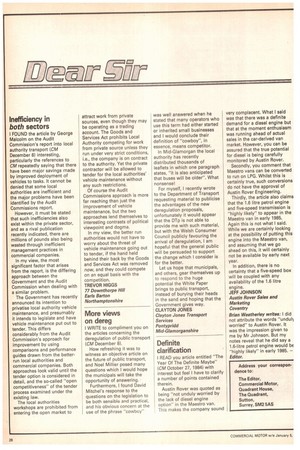Inefficiency in both sectors
Page 30

If you've noticed an error in this article please click here to report it so we can fix it.
I FOUND the article by George Malcolm on the Audit Commission's report into local authority transport (CM December 8) interesting, particularly the references to CM repeatedly saying that there have been major savings made by improved deployment of vehicles to tasks. It cannot. be denied that some local authorities are inefficient and the major problems have been identified by the Audit Commissions report.
However, it must be stated that such inefficiencies also exist within the private sector, and as a rival publication recently indicated, there are millions of pounds also being wasted through inefficient management practices in commercial companies.
In my view, the most significant factor that arises from the report, is the differing approach between the Government and the Audit Commission when dealing with a similar problem.
The Government has recently announced its intention to privatise local authority vehicle maintenance, and presumably it intends to legislate and have vehicle maintenance put out to tender. This differs considerably from the Audit Commission's approach for improvement by using comparisons and performance guides drawn from the betterrun local authorities and commercial companies. Both approaches look valid until the tender option is considered in detail, and the so-called "open competitiveness" of the tender process examined under the existing law.
The local authorities workshops are prohibited from entering the open market to attract work from private sources, even though they may be operating as a trading account. The Goods and Services Act prohibits Local Authority competing for work from private source unless they run under very strict conditions, i.e., the company is on contract to the authority. Yet the private contractor will be allowed to tender for the local authorities' vehicle maintenance without any such restrictions.
Of course the Audit Commissions approach is more far reaching than just the improvement of vehicle maintenance, but the two approaches lend themselves to interesting contrasts of political viewpoint and dogma.
In my view, the better run authorities would not have to worry about the threat of vehicle maintenance going out to tender, if the hand held behind their back by the Goods and Services Act was removed now, and they could compete on an equal basis with the cornpetition.
TREVOR HIGGS 77 Downthorpe Hill Earls Barton Northamptonshire
































































